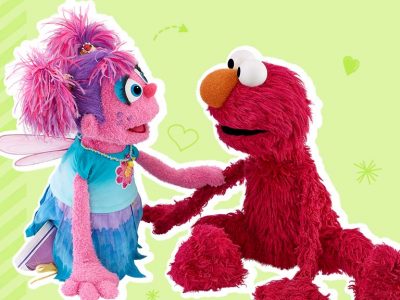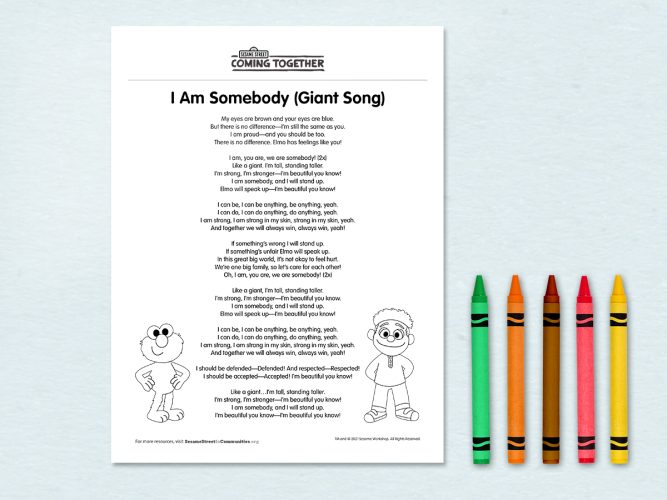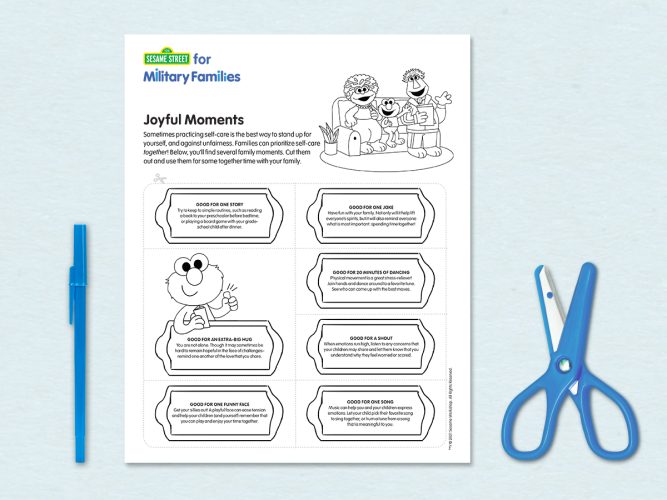
Week 2: Compassion Builds Community
Compassion helps us promote more inclusive and equitable communities.
Welcome to Week 2, Day 1 of Room to Grow!
These resources promote self-confidence and explore ideas around self-care with children as they interact with their communities.
Day 1: Classroom Communities
Day 1: Classroom Communities
As children learn to feel good about their unique gifts and personalities, they’ll be more equipped to embrace the good that comes with appreciating and valuing diversity so they can feel strong in their own skin! This in turn will help foster a greater sense of compassion and empathy, and will encourage them to advocate for a friend in need.
Watch and share the video I am Somebody (Giant Song), and download Sing Along!
Children “stand tall” when they feel confident in who they are. This happens when diversity is celebrated and a strong sense of self is nurtured. You can start the day with a song, and use these tools to remind children who have moved frequently or are missing their deployed parents to remember their greatness!
Day 2: Provider to Parents
Day 2: Provider to Parents
It’s never too early to promote racial understanding in children, and there are multiple ways to engage with children right where they are. As parents and caregivers explore these materials, they will grow in their own comfort when having these discussions, learn that the effort should be ongoing, and remember that we all start somewhere! These resources can help you remind caregivers that even little moments and everyday dialogue can make a big impact.
Watch Talking With Children and read Never Too Young: Ages and Stages of Racial Understanding
Research shows that even babies notice racial differences, and toddlers and preschoolers show racial biases. Children are sponges—they learn quickly and try to make sense of the rules of their community. They’re gathering information to “paint their world,” and trying to figure out important things such as:
- Who do I know? Who is a stranger?
- Who is different? Who is similar to me?
- Who belongs? Who doesn’t?
As adults, we teach children how to behave in our communities and our cultural groups, and we also teach them about differences. If we stay quiet when children witness racism, our silence can teach them that these interactions are okay.
Instead, we can help children take care of themselves, stand strong in their own skin, stand together as allies to one another, learn to honor and celebrate differences, and find similarities and connections across all groups. If we can step in and guide children in dealing with challenging race-related situations, we can help them develop a healthier view of themselves, their communities, and the world.*
*The above information is adapted from “Racial Trauma and Responding to Racism” by Chandra Ghosh Ippen, PhD
Day 3: Fun With Families
Day 3: Fun With Families
Today is all about helping parents playfully engage with their children. We can take care of ourselves, together, and parents and children can have fun while incorporating self-care for everyone in the family. This resource will help you remind military families that even little moments and everyday routines can make a big impact.
The cards reflected in this printable resource can be cut out and shared with families celebrating self-care. As you share with caregivers, you may suggest:
- Cutting out the cards and distributing them to different family members who can ‘gift’ them to each other!
- Placing the cards in a bowl, and taking one out each evening for a moment of family time!
- Keep them on a refrigerator so that everyone remembers a few different ways to stay connected!
Day 4: Professional Practice
Day 4: Professional Practice
Racism is devastating to both individuals and groups, so approaching conversations with appropriate levels of empathy, knowledge, and understanding is key to building a more equitable society. You’ll learn strategies to explore the importance of moving towards equity, and this webinar will help enrich your commitment to this lifelong journey, no matter where you first began.
Watch the webinar The ABCs of Racial Literacy.
Throughout this course you will notice an occasional use of the word anti-racist to refer to a person who actively opposes racism and promotes racial tolerance.
Day 5: Questions and Reflections
Day 5: Questions and Reflections
The experiences children have caring for themselves and others is shaped by the modeling of the adults in their world. As we grow to understand the powerful ways we can contribute to how children and families build community, we can reflect on our own growing understanding of identity and care. When we know who we are, we can engage with the world in compassionate, clear ways!
Please take a few moments to reflect on lessons from this week.
- What was one important idea raised by the resources this week?
- Why do you consider that idea important?
- What steps will you take to continue learning? What is one concrete goal you can set for yourself?
- How can you help children have a strong sense of self if their family is experiencing deployments or moving?
A 2nd grade student asked me to help find a friend during recess. I said that I forgot what that friend looked like. He said, “You forget what their skin looks like.” (The student we were looking for did have a different skin tone than the one asking). I said, “I can’t remember what your friend’s face looks like so I don’t know who I am looking for.” This makes me think further in how I answered and what more we could have talked about.
— Christie G., Early Childcare Provider
Congratulations!
You’ve finished the Week 2!



